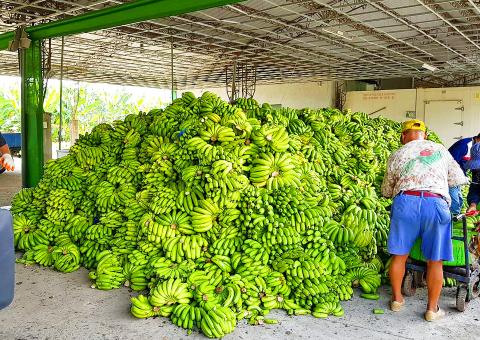Taiwanese researchers have developed a method using nanotechnology to extend the shelf life of bananas for 23 days.
The team was led by National Chung Hsing University professor Lin Yao-tung (林耀東).
Exhibiting the team’s techniques at a Ministry of Science and Technology pavilion at Computex Taipei on Wednesday last week, Lin said the technique is commercially feasible and more than 80 businesses, including household electric appliance suppliers, have approached the team seeking collaboration.

Photo: CNA
While plunging banana prices have grabbed media attention over the past few months, it is not a new problem, Lin said, adding that he has spent nine years researching techniques to extend the shelf life of various fruits.
Lin said he missed Taiwan’s various kind of high-quality bananas when studying in the US, adding that banana exports are unfortunately much weaker than local consumption.
Chilean agricultural products are exported an average distance of 11,157km and those of New Zealand an average of 10,765km, while Taiwanese agricultural products are exported an average of 1,793km, highlighting the nation’s need to develop more advanced techniques for keeping fruit fresh, he said.
Working with researchers in plant pathology, animal science and other domains, the team used mineral materials and agricultural waste to develop a coating for cardboard cases that slows down the ripening process by insulating the bananas during transportation, he said.
The results showed that the coating extended the shelf life of bananas, he said, adding that the technique could also be used in warehouse management systems.
The team also plans to collaborate with information engineers in developing an automated system for monitoring crops as they ripen, Lin said, adding that the system might soon be turned into a mobile app for farmers.
Asked about the cost of the technique, Lin said that academics spend less time thinking about business affairs.
The team might seek cooperations with companies that have expressed an interest in their technology, he added.
Lin teaches in the university’s Department of Soil and Environmental Sciences, where two graduate students, Tu Kai-fen (涂凱芬) and Yan Li-ting (嚴莉婷), have started an agricultural technology company named Agritech (艾格泰).

TPP RALLY: The clashes occurred near the Chiang Kai-shek Memorial Hall on Saturday at a rally to mark the anniversary of a raid on former TPP chairman Ko Wen-je People who clashed with police at a Taiwan People’s Party (TPP) rally in Taipei on Saturday would be referred to prosecutors for investigation, said the Ministry of the Interior, which oversees the National Police Agency. Taipei police had collected evidence of obstruction of public officials and coercion by “disorderly” demonstrators, as well as contraventions of the Assembly and Parade Act (集會遊行法), the ministry said in a statement on Sunday. It added that amid the “severe pushing and jostling” by some demonstrators, eight police officers were injured, including one who was sent to hospital after losing consciousness, allegedly due to heat stroke. The Taipei

NO LIVERPOOL TRIP: Taiwan’s Lin Yu-ting, who won a gold medal in the boxing at the Paris Olympics, was embroiled in controversy about her gender at that event Taiwanese boxer Lin Yu-ting (林郁婷) will not attend this year’s World Boxing Championships in Liverpool, England, due to a lack of response regarding her sex tests from the organizer, World Boxing. The national boxing association on Monday said that it had submitted all required tests to World Boxing, but had not received a response as of Monday, the departure day for the championships. It said the decision for Lin to skip the championships was made to protect its athletes, ensuring they would not travel to the UK without a guarantee of participation. Lin, who won a gold medal in the women’s 57kg boxing

‘NOT ALONE’: A Taiwan Strait war would disrupt global trade routes, and could spark a worldwide crisis, so a powerful US presence is needed as a deterrence, a US senator said US Senator Deb Fischer on Thursday urged her colleagues in the US Congress to deepen Washington’s cooperation with Taiwan and other Indo-Pacific partners to contain the global security threat from China. Fischer and other lawmakers recently returned from an official trip to the Indo-Pacific region, where they toured US military bases in Hawaii and Guam, and visited leaders, including President William Lai (賴清德). The trip underscored the reality that the world is undergoing turmoil, and maintaining a free and open Indo-Pacific region is crucial to the security interests of the US and its partners, she said. Her visit to Taiwan demonstrated ways the

The US has revoked Taiwan Semiconductor Manufacturing Co’s (TSMC, 台積電) authorization to freely ship essential gear to its main Chinese chipmaking base, potentially curtailing its production capabilities at that older-generation facility. American officials recently informed TSMC of their decision to end the Taiwanese chipmaker’s so-called validated end user (VEU) status for its Nanjing site. The action mirrors steps the US took to revoke VEU designations for China facilities owned by Samsung Electronics Co and SK Hynix Inc. The waivers are set to expire in about four months. “TSMC has received notification from the US Government that our VEU authorization for TSMC Nanjing